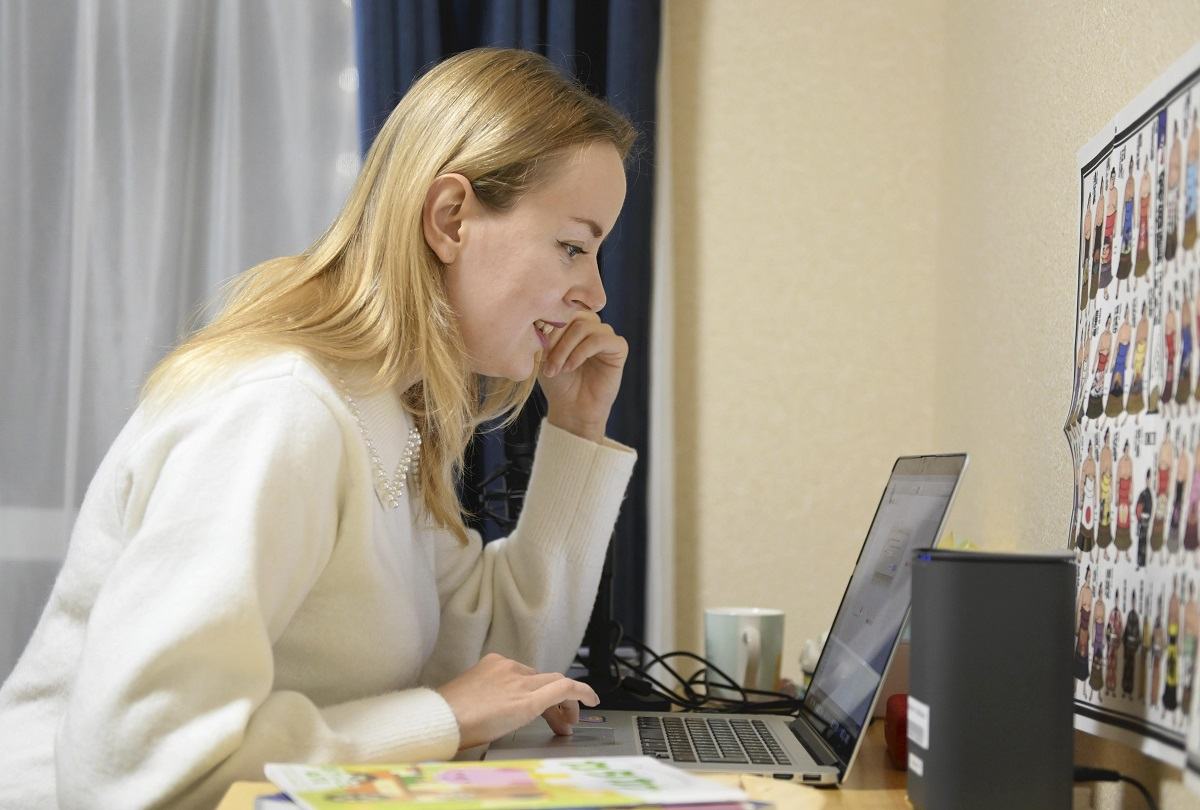
Iryna Derhachova teaches Japanese online in late February to fellow Ukrainians who fled their country to Japan.
12:17 JST, March 24, 2023
Many Ukrainian refugees who fled to Japan in the wake of Russia’s invasion of their country are encountering a language barrier.
To help address this situation, Iryna Derhachova, who had studied Japanese in Ukraine and escaped to Japan last April, recently started teaching the language to compatriots who have arrived after her. “I hope I can be of some help to my fellow Ukrainians,” said Derhachova, who lives in Katsushika Ward, Tokyo.
Online classes
In late February, about 20 evacuees from Ukraine, now living in Osaka, Okinawa and elsewhere across Japan, participated in an online Japanese language class held by Derhachova.
Derhachova, 29, observed as the participants greeted each other and introduced themselves online in Japanese while using her teaching materials. “You’re doing great,” she said. She also offered such advice as “If you’re currently unemployed, it’s best to tell prospective employers about your previous jobs so they can know more about you.”
Derhachova majored in Oriental linguistics at a graduate school in Kyiv and taught Japanese to university students. She has been studying Japanese for about 10 years and is a fan of Haruki Murakami, anime films produced by Studio Ghibli Inc. and Japanese music.
In 2019, she found a job in Japan, which had been one of her dreams. But in July 2021, she was forced to start teleworking due to the spread of COVID-19 and started to grow lonely. She eventually returned to Ukraine.
Fleeing for her life
Upon her return, Derhachova resettled in her hometown of Kharkiv in the eastern part of Ukraine, near the Russian border. The city came under heavy attack after the Russian invasion began on Feb. 24, 2022, and a missile landed near her home.
On March 4, Derhachova and her 50-year-old mother went to the railway station with the aim of leaving the city. While waiting in the crowded station for an early morning train, a sudden flash lit up the sky followed by a deafening explosion that rocked the station building.
A station staffer shouted: “Get below ground fast!” Derhachova, her mother and many others rushed down the stairways and into the subway. Derhachova recalls crying while thinking that they all were going to die there.
Their train departed early the following day. It took nearly 24 hours to reach Lviv in the western part of the country — a journey that normally took eight hours. Derhachova finally arrived in Japan by way of Slovakia in mid-April last year.
‘I want to help’
Derhachova found life in Japan as a “refugee” very different from her previous life here. Whenever she heard an airplane, she would look around for an escape point. Once, while attending a handicraft class where she hoped to feel at ease, she broke down and wept uncontrollably.
When looking at a Japanese public utility bill, she unwittingly overlooked the fact that the payment had been deferred due to the COVID-19 pandemic. “Have I gone out of my mind?” Derhachova recalls asking herself. She became increasingly perplexed and lost confidence.
Despite such setbacks, however, she used her Japanese language skills to help fellow evacuees with such tasks as visiting a ward office and signing up for a cell phone contract. She even accompanied an acquaintance to a job interview and acted as an interpreter. When she saw the woman’s face light up after she got a job, Derhachova felt some of the weight lift from her shoulders.
“Those who don’t understand the Japanese language are likely much more troubled than me,” Derhachova said. “I want to help my fellow Ukrainians as much as I can.”
Almost a year has passed since Derhachova left Kharkiv. A friend who still lives in her Ukrainian hometown told her half-jokingly: “I’ve gotten used to the sound of fighter jets now. These days, I can even tell if approaching planes belong to Ukraine or Russia.”
Derhachova says she cannot dispel a sense of guilt over having left her home country. Nevertheless, her resolve remains strong. “There is something that only I can do, and only here in Japan,” she said.
Derhachova now thinks she will live here for some time.
Top Articles in Society
-

Producer Behind Pop Group XG Arrested for Cocaine Possession
-

Man Infected with Measles Reportedly Dined at Restaurant in Tokyo Station
-

Man Infected with Measles May Have Come in Contact with Many People in Tokyo, Went to Store, Restaurant Around When Symptoms Emerged
-

Woman with Measles Visited Hospital in Tokyo Multiple Times Before Being Diagnosed with Disease
-

Australian Woman Dies After Mishap on Ski Lift in Nagano Prefecture
JN ACCESS RANKING
-

Producer Behind Pop Group XG Arrested for Cocaine Possession
-

Japan PM Takaichi’s Cabinet Resigns en Masse
-

Man Infected with Measles Reportedly Dined at Restaurant in Tokyo Station
-

Israeli Ambassador to Japan Speaks about Japan’s Role in the Reconstruction of Gaza
-

Videos Plagiarized, Reposted with False Subtitles Claiming ‘Ryukyu Belongs to China’; Anti-China False Information Also Posted in Japan























